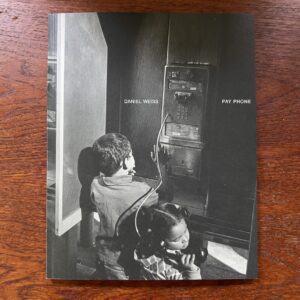JTF (just the facts): Published in 2015 by Fundacja Sztuk Wizualnych (here). Hardcover, 40 pages, with 20 color photographs. Includes a short text by the artist. In an edition of 300 copies. (Cover and spread shots below.)
Comments/Context: The past several years have been a time of continued civil unrest in Ukraine. A wave of demonstrations shook the country throughout November and December of 2013, leading to expanded violence and ultimately resulting in a bloody revolution in February of 2014. Since then, Ukraine has fallen into a dramatic civil conflict and proxy war with Russia, with ongoing aggressions and political uncertainty.
Striking photographs documenting the intensity of the Ukrainian unrest have appeared in the media worldwide, and several excellent photobooks have emerged in the aftermath, depicting the events as they were unfolding, often immersing us into the chaotic mood of the people. Euromaidan by Vladislav Krasnoshchok and Sergiy Lebedynskyy, Barricade by Julia Polunina-But, and Maidan by Anastasia Taylor-Lind are just a few of the most well-known.
Yulia Krivich is a young photographer from Ukraine, and her work has undeniably been influenced by the events that have unfolded in her motherland, particularly in the ways they are shaping the younger generation and the realities of their everyday lives. She graduated from the Academy of Fine Arts in Warsaw and now lives and works in Poland, focusing her photography on contemporary youth culture in the wider post-Soviet region. In 2015, her work was included into the Photomonth Festival in Krakow, and as a result, Krivich had an opportunity to collaborate with the Polish graphic designer Ania Nalecka, who is known for her innovative approach to book making. Presentiment is Krivich’s first photobook, and in many ways, it is an introduction to a larger project she has been working on since 2011.
Unlike much of the on-the-ground photojournalism from Ukraine, Krivich’s work takes a different approach, opting for a more personal and reflective engagement with the subject – there are no battles with explosions or burning barricades; it’s not even entirely obvious that the photographs were taken in Ukraine. Living outside her home country has made Krivich more sensitive to and aware of its reality and heritage, and she captures the ongoing changes in her homeland in a very subtle and delicate way. As the artist states in a short text accompanying the book, “a presentiment is an irrational state, an inexpressible signal that something is approaching”, and her book sits on that edge of anxious anticipation, mixing calm moments and unsettling feelings with indirect symbols of violence and hidden war.
Presentiment is part of Krivich’s larger ongoing project, and as a result, she decided to include a rather small selection of twenty photographs in this first publication. The design and original construction of the book reinforce its visual flow and both are essential to understanding its content. The photographs are printed on newspaper, similar to the casual feel of a zine, and are stitched to a linen hardcover (to some extent they even look like two separate elements). The photographer’s name is embossed on the cover, but it is hardly visible, the grey title of the book appearing on the spine in four languages, without spaces between the words. The process of opening the book and unfolding the thin pages requires some care. The pages are stitched only half way, and as we turn them, they look broken at the top, physically illustrating the fragility of the object and its content.
The book opens with an almost peaceful image of clouds and small whirlwinds over the slightly disturbed water surface of the Black Sea; it is followed by a rainbow over the sea, shot from a hill on a sunny day. As we carefully turn fragile pages, the unsettled mood begins to change and the content becomes more intense. There is an image of armed men in front of what looks like an administrative building, wearing helmets and holding protective shields. Another picture features a close up shot of a young woman, her neckline decorated with disturbing scars. In the middle, there is an image of a young man in a white tank top lying on a bed, with a line of sunlight slashing across his closed eyes.
These sudden shifts and fragments build the uncertainty of the visual narrative, highlighting Krivich’s troubled feelings and anxieties – there is a constant sense that something is about to happen. As we open the book, and have to unfold the zine, we see a fragment of the photograph which is also the last one in the series. It captures an arm lying against the background of an oriental carpet, the pattern of the sweater playing with the one below it on the carpet, with a small tattoo of the infinity sign on the wrist connecting beginning and end in one continuous loop. Another photograph captures the back of a girl in a white sport bra as she stands on the balcony, her hands in her pockets as she seems to look down to the street as if waiting for something. Krivich’s sequencing and layering make us question the meaning and connections between the photographs. People appear throughout the book (they are universally young), yet carefully chosen angles hide their faces and feelings, adding tension to the progression.
This carefully crafted photobook, with it is hard cover protecting its fragile content, is a thoughtful illustration of the complex state of contemporary Ukrainian society and the conflicted and contradictory feelings the current situation evokes for its residents. In sharing her anxieties and uncertainties, Krivich offers a delicate and sometimes harrowing expression of a collective subconscious mood. This is a historical moment full of open-ended dualities and contrasts, and her smart book explores the search for personal identity amid that tenuous societal balance.
Collector’s POV: Yulia Krivich does not appear to have gallery representation at this time. As such, connecting with the artist directly via her website (linked above in the sidebar) is likely the best option for those collectors interested in following up.

















